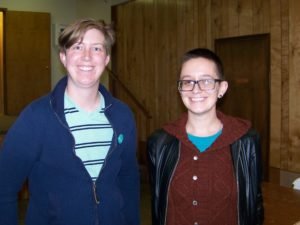“Pop Your Social Bubble” Was Great Last Night

I attended “Pop Your Social Bubble: Meet Your Transgender Neighbor” last night at Lutheran Church of Christ the King as the result of an invitation I received from Pastor Peter Mohr.
The panelists (Nora, Mac and Karla) were the same ones from the Indivisible Puyallup/Tacoma gathering, which I wrote about in the blog post “Get to Know Your Transgender Neighbor.” This was their first presentation to a non-political church group, and it went off splendidly.

Mac and Karla
(photo taken at Indivisible Tacoma/Puyallup presentation, IBEW Hall, Tacoma)
The presentation itself consisted of defining various terms–cisgender, transgender, queer, and more–and explaining the different ways in which TG folks can elect to transition:
Social transitioning consists of asking significant others (family, friends, classmates, teachers, church associates) to start calling them by their chosen names (instead of their “dead names”) and dressing, grooming and presenting as the gender they truly are instead of the gender they were presumed to be formerly.
Legal transitioning consists of having legal records changed to the individual’s true status: Male to female or female to male, or X if someone feels neither male nor female. So birth certificates, driver licensing, marriage records, anything that needs to be officially recorded in a court of law. (Not all states allow these changes yet.)
Medical transitioning can consist of hormones, hormone blockers, and surgeries to conform/confirm the gender identity that resides in the individual’s brain, heart and soul.
Not every TG individual transitions in the above ways. Two-Spirit people embrace their duality; Naive tribes considered Two-Spirit people especially blessed and gifted because they can witness to both male and female experiences and insights.
Many TG people don’t transition because they fear the societal repercussions: transitioning can endanger job security, provoke violence, sever family bonds, and do other things that cisgender folks rarely have to confront or worry about. 40% of homeless youth are LGBTQI individuals whose families tossed them out when they declared their status. 33 TG people have lost their lives this year (as of two months ago) and about the same number have been killed in previous years–usually male-to-female TG women of color.
Many more never transition medically because the cost of hormones and/or gender confirmation surgery is prohibitive or because they have preexisting medical conditions that preclude them from undergoing surgery at all (high blood pressure, blood clotting issues, etc.)
“Passing” Another aspect of transitioning is how well an individual “passes” as the gender they’re transitioning to externally as the result of hormones, surgery and/or dress/presentation.
Passing is especially important to a lot of people because one’s employment and personal safety can be greatly affected (threatened!) by malevolent or phobic people.
The flip side is “passing” so well that someone falls in love with a TG individual, only to discover (or be told after the fact) that the person they love hasn’t always presented or lived as they do now.
As with all budding relationships, it’s hard to know when to risk becoming completely transparent and vulnerable. A TG person falls in like and then in love in the same way cisgender folks do, but they have additional fear factors to contend with: the fear of 1.) being outed if they aren’t out publicly 2/) being rejected out of hand by someone they love very much and/or 3.) being violently attacked and perhaps killed in a fit of rage before, during or after a romantic encounter when the object of one’s affection discovers one’s TG status.
When it comes to transitioning or gender presentation, FtM (female to male) menfolk have it a lot easier than MtF womenfolk because it’s common to see women in masculine jeans, shirts, boots, ties, etc.
It’s much less common to find men in dresses, skirts and heels.
So TG women are, in my opinion, among the bravest souls on the planet.
They have to be truly driven to live authentic lives in order to proclaim themselves women during these immensely volatile times.
Coming out as transgender right now for them can be downright dangerous. My heart goes out to them, even as my hat is off to them.
There were a lot of great questions from the audience following their presentation. Everyone seemed relaxed and very, very welcoming and affirming. But then, I expected that of Pastor Peter’s congregation, at least 30 of whom showed up last night to learn more about the TG experience.
Pastor Peter asked the panel “What do welcoming/affirming churches need to start and stop doing so LGBTQI individuals will feel truly welcome and valued?”
Mac–whose pronouns are they, them and their–said their dad is a Christian pastor so they grew up in church.
What they see as they and their wife look for a welcoming, affirming church in the Tacoma area includes
- non-gendered bathrooms (which is the case at LCCK)
- whether the pastor affirms and includes sermons that are knowledgeable and nonjudgmental about the LGBTQI community and its experiences and existential threats, and
- the response of church staff and other parishioners
One funny thing Mac mentioned in this regard is a church staff’s tendency to want to introduce them and their wife straightaway to the other LGBTQI parishioners, instead of introducing them the way they’d introduce everyone else.
Mac suggested, “Maybe let the existing LGBTQI parishioners know about the newcomers and then let them decide whether or not to connect.”
Labeling and introducing/herding people according to gender orientation, sexual orientation, color, or other identifiable characteristics may seem like the right thing to do so new folks can feel they’re among friends right away, but LGBTQI individuals and people of color are quite accustomed to interacting with all kinds of people, so these kinds of introductions feel more like labeling and sequestering than inclusion when we’re introduced first or primarily to others who are assumed to be “just like us” because we’re in the same LGBT “box” (community).
LGBTQI folks are all over the place politically and socially; we don’t immediately adore every other LGBTQI individual we meet any more than cisgender folks do. Give us the ability, and the space, to make our own choices when it comes to socializing with others.
The questions from the audience were respectful and insightful. (The ones that follow aren’t exact questions; they’re paraphrases to clarify what the questioner intended to ask. Many times they aren’t sure how to pose a question.)
“What/when did it first occur to you that you were mis-gendered/that your brain doesn’t agree with the outward presentation of your gender (breasts/chests, genitals)? And how does that feel?”
I think it’s almost impossible for a cisgender person to understand what it is or how it feels. When you’re 100% comfortable in and with your own body (as far as your gender orientation is concerned), it’s hard to imagine not being comfortable in it.
I liken it to being in the wrong costume or vehicle. It feels like it’s not like a genuine part of you.
It’s like a Mercedes would feel (if a Mercedes could feel!) being trapped inside a soap box derby chassis. It feels like you’re imprisoned in too small a space. You feel like you’re lacking parts of yourself that should have been issued as standard equipment from the get-go.
Back when I was in school, girls had to wear dresses or skirts. There was no other option. So I wore dresses or skirts. Hated them. Loathed them! They were a costume; a mandated uniform. They were not EVER me. Girls back then were forced to present as female.
But the minute I got home, it was back to jeans, sweatshirts and boots again. I was a cowboy, not a cowgirl, and I knew it.
“As a middle school teacher, how can I best support LGBTQI individuals? Are there any resources for school teachers who want to support LGBTQI students?”
Yes, there are.
King’s Books in downtown Tacoma has a section on LGBTQI topics for all age groups.
My book Womb Man: How I Survived Growing Up in a Booby-Trapped World has a references and resources section at the back of it.
Note to LCCK parishioners: I left two copies of Womb Man with Carol for the library for those who worship there. You can check out a copy if you want more information, or a complete detailing, of what it’s like to be transgender as a prepubescent child with no way to explain or express your dilemma, Womb Man can take you there…
All in all, a very productive night. It was terrific to reconnect with so many LCCK friends and allies. One of my favorite outings ever! I think I may have to start attending there from time to time. Brian Berns is preaching this coming weekend. I think I’ll go then! I’ve never heard him preach and he’s one of my dearest friends, so it’s time!
As an Amazon Associate I earn from qualifying purchases
This weekly blog is reader supported.
If you enjoy my posts, and want to show your appreciation, please do so via PayPal. (My email address for Paypal is kristinemsmith@msn.com. Remember the m between my first and last names so your gift doesn’t misfire. If you go this route, please be sure to include your email address in the notes section, so I can say thank you.
Which I am going to say right now. Thank you!
